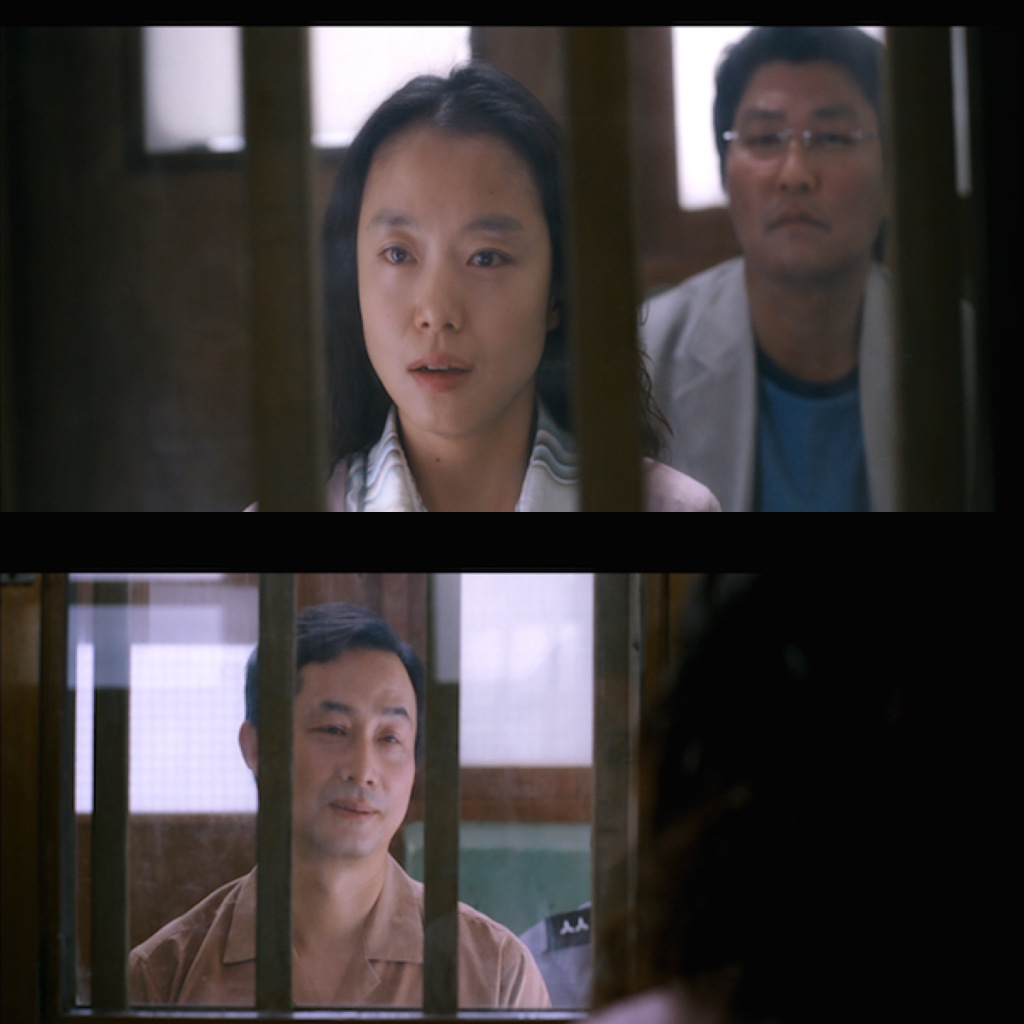
During a pivotal scene in Lee Chang-dong’s film Secret Sunshine (2007), the newly converted Christian Lee Shin-ae is brought face to face with the killer of her child, Park Do-seop. She arrives with an entourage of supporters from her church and an armful of flowers, ready to accord him forgiveness for his egregious act of cruelty. It is a set-up established with all the rectitude of religious sincerity. As Shin-ae enters the room, face separated from his by a glass panel, she begins to remark of her newfound peace, one that has inhered in the comfort of her faith.
As she looks up, expecting a grovelling plea for mercy, she instead finds Do-seop, clad in his inmate’s overalls, awash with serenity. He, too, has found Christ; he, too, has experienced the beauty of being forgiven. The unflappability of his peacefulness punctures the act of her forgiveness altogether – it sets in motion her subsequent disavowal of Christianity and spiral into self-harm, grief and anger mingling in the theological contradictions and hypocrisy that permit such a smooth glossing over of wrongdoing. Repentance has taken place behind the clatter of bars, and the forgiveness of God takes precedent over the forgiveness of a hurt party.
Intuitively, I felt compelled to dispute the film’s misprision, or at least that was what it struck me to be. The act of forgiveness begins not from divine restitution, but from a genuine recognition of the hurt inflicted upon another person. There can be no heft to Christian mercy and charity if forgiveness has not been sought from an aggrieved party; to suggest otherwise would be a contravention of the principle of loving others as oneself. Forgiveness is not obtained through the quick cheapening of grace, it is necessarily pursued with a genuine recognition of hurt, an inward reckoning with the depth of pain caused to the recipient of harm. It is as Christ himself mentions:
So watch yourselves. “If your brother or sister sins against you, rebuke them; and if they repent, forgive them. Even if they sin against you seven times in a day and seven times come back to you saying ‘I repent,’ you must forgive them. [1]
Repentance and initiative are the preconditions to forgiveness. Perhaps that was what unsettled me most about Do-seop in Secret Sunshine, that an inner peace could have been so easily obtained without a sense of obligation to Shin-ae, having processed the panic, anguish, and imitable horror of finding her beloved son abducted and murdered. A forgiveness that is pre-emptively conferred onto oneself is no forgiveness at all.
It is a great cliché of our present age that we dwell in the indignation of grievance. Our primary avenues of social interaction online foment and thrive on reduction and simplification, drawing our eyes to that which maximises the intensity of our emotional responses. It is an eyeball economy that keeps the commercial logic of social media afloat, the monetisation of anger and disgust to sustain platforms and groups and campaigns. The doomscroll is as much an outrage-scroll; endorphins flare up when one is confronted by the endless litany of indignities that one can invest their energies in. The futility of bearing a thousand cuts, not least when the accountability that forgiveness demands evaporates under the guise of anonymity or incorporeal distance.
I have taken to putting down my phone and reducing the hours I spend flicking through Instagram and Facebook. Thank God I logged off of Twitter years ago. Christ says in His Sermon on the Mount, ‘do not worry about tomorrow, for tomorrow will worry about itself. Each day has enough trouble of its own’. [2] There is only so much lividity that can be swallowed each day, only so much battering that a mind and conscience can take, only so much patience one can exercise toward the forbearance of extraneous, depersonalised conflict.
The knot of unresolved conflict, and the bitterness of a grudge it results in, often draws me back to the thickened conceptions of static anguish in tragedy. I think of Sophocles’ Antigone: the irrepressible groans for her inability to bury her brother Polynices, attempting, as Judith Butler opines, to grieve ungrievable life. [3] The interminable knot that Antigone encounters is a clash between the duty she owes to her family and the legal obligations of the polis, or the city-state. Polynices’ crimes against the polis, his attempt to usurp power, rubs up against Antigone’s sisterly obligations. It drives King Creon, incumbent ruler, to forbid an honourable burial. Antigone sacrifices the honour of motherhood, raising children, or a wedding ceremony to starve in the outskirts of the city, yielding an additional dimension of pathos to her fate. Antigone is unable to realise a Greek ideal of femininity as she laments:
Unwept, unloved, unmarried
I am led away in sorrow
to the path that awaits me,
no longer allowed to see
that sacred eye of flame;
tearless is my doom, lamented
by none of my friends. [4]
If forgiveness is to be regarded as a sacred ideal, it necessarily demands a way of forging a synthesis between seemingly irresolvable desires and ethical systems. The swapping of an ancient Greek ethical paradigm for a Christian one is subversive, as an aggrieved party must lay aside the irreducibility of a given position in a spirit of compromise. Of course, this may detract from the governing impulses of Christian martyrdom, a question that is far more eschatological and existential, but it nevertheless draws to mind that forgiveness thrives in averted pride and intentional peacemaking.
I also think of Eugene O’Neill’s Long Day’s Journey into Night (1942), [5] a play that has continued to haunt my imagination ever since I first read it when I was eighteen. Perhaps it was its unabashed proximity to O’Neill’s own family that made its dialogue leap searingly off the page: every spat, every quibble, every comment that cut through bone and marrow. There was an untidiness to the overlapping web of grievances and unresolved conflicts that made me shudder: Tyrone’s disapproval of Jamie’s sloth, Jamie’s anger toward Tyrone for foregoing medical treatment for Edmund’s tuberculosis, Mary’s resentment of Edmund because of how his birth led to her morphine addiction, Edmund’s stammering, fog-like thinking drawing him away from the incessant chatter of his household, Mary’s desire to seek out the unlived life she gave to be Tyrone’s bride.
On and on and on the family, fueled by drugs and alcohol, exchange barbs so pointed that one can only imagine the piercing of flesh onstage. It always made me wonder what the threshold at which forgiveness and anger find their end was, if there can be said to be one at all. It brought to mind the arguments and disputes I’ve been privy to in my own home, the needless sparks that can set off an escalation in jibes, the voices rattling off of the walls amidst tears and wailing, the developing impulse to defuse, rather than goad.
If one is to learn how to forgive, one must also learn how to apologise: to make clear an admission of wrong, to affirm the hurt suffered by an aggrieved party, to seek the forgiveness of another. It is only at this point of contrition that an ease of conscience can drive one to seek God. The restitution of divine relationship can only be made after the restitution of an earthly relationship; we come to God in the same spirit with which we come to those made in His image. It portends an end to interminable cycles of conflict and hatred: the blindness that Gandhi warns of if we keep going for each other’s eyes, the foe that Blake warns will be killed if we keep nurturing our poisoned apples, or, as Heaney once wrote, the suffering that no poem or play or song can ever fully address.
It is the war within our internal factions that we must learn to resolve before we can begin to address the ones we have caused among others. Forgiveness provides the foundation for the long, enduring work of tackling tribalism and the crawling practice of demonisation, the reminder of the histories we have of societies rending themselves apart, and its ensuing bitter stains of blood. It is knowing that even if our flesh is torn, our faces are spit at, and our mettle is broken, that there is a divinity that furnishes the ability to forgive, to say, ‘Father, forgive them, for they do not know what they are doing.’
It is only at the place of resolution and stillness that fortitude yields its face, as does the prospect of communality, solidarity, and hope. Forgiveness is no panacea, but it is where petty grievance faces its end.
***
Ceasefire
Michael Longley (1998)
I
Put in mind of his own father and moved to tears
Achilles took him by the hand and pushed the old king
Gently away, but Priam curled up at his feet and
Wept with him until their sadness filled the building.
II
Taking Hector’s corpse into his own hands Achilles
Made sure it was washed and, for the old king’s sake,
Laid out in uniform, ready for Priam to carry
Wrapped like a present home to Troy at daybreak.
III
When they had eaten together, it pleased them both
To stare at each other’s beauty as lovers might,
Achilles built like a god, Priam good-looking still
And full of conversation, who earlier had sighed:
IV
‘I get down on my knees and do what must be done
And kiss Achilles’ hand, the killer of my son.’
***
peacemaker
“In your anger do not sin:
Don’t let the sun go down while you are still angry,
and do not give the devil a foothold.”
— Ephesians 4:26-27 (NIV)
again, we must sting and be stung,
silence unsettled as breathless air.
anger swallowed by the fading sun,
daybreak wipes the slate of bitterness clean.
your mother swallows her own acrid pills, washed
by a burgundy swirl. your father retreats into an
electronic cacophony, vanishing jewels and
carcinogenic vapour. the pallor of neon desk lights
falls over your brother’s half-done worksheets and
half-played rap videos. your brother’s incantatory pacing
behind closed doors tapers off.
somehow, there is space
for arms wrapped around teenage reticence, for the days
to be painted in the moments before sleep, for the silence to settle
into quiet forbearance, its own resignation, a balm that rests
burning for its own sake.
***
[1] Luke 17:3-4, Holy Bible: New International Version.
[2] Matthew 6:34, Holy Bible: New International Version.
[3] Bonnie Honig, ‘Antigone’s Laments, Creon’s Grief: Mourning, Membership, and the Politics of Exception’, Political Theory, 37.1 (2009), pp. 5-43 (p. 7).
[4] Sophocles, Antigone, in The Greek Plays: Sixteen Plays by Aeschylus, Sophocles and Euripides, trans. by Frank Nisetich, (Modern Library, 2016), 886-872.
[5] Eugene O’Neill, Long Day’s Journey Into Night (Great Britain: Jonathan Cape Ltd., 1956; repr. 1966),
***
First published at:
jonbcy.wordpress.com/2020/12/30/on-forgiveness/
December 2020.

